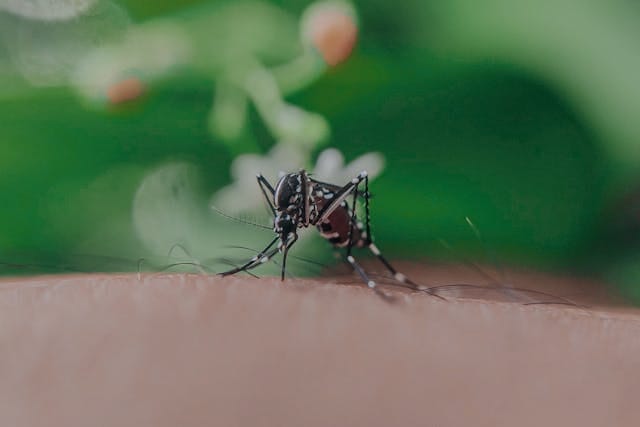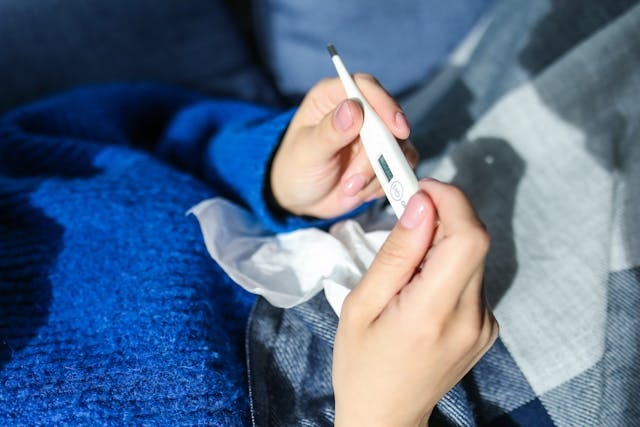
How do I Check if I have Malaria? What are the main Malaria Symptoms?
Time to read 3 min
Time to read 3 min
You can get a blood smear test which can check for the parasite under a microscope. You can book the test at any general hospital and get tested through a blood draw method. Your treatment protocol will be prescribed after the doctor checks your symptoms and your overall condition.
There are also several malaria symptoms that you should watch for, giving you the right information about your preliminary diagnosis. Your doctor will be able to examine your condition, check for antigens, and test for any potential secondary conditions that may arise.
The malaria test is the blood smear examination which can help in detecting the parasite associated with malaria. Your blood sample is treated with Giemsa stain and the red blood cells are checked under the laboratory observation.
Your malaria diagnosis will also involve your major symptoms, which can depend based on several factors. Your doctor will be able to provide more information with regards to the diagnosis and the treatment protocols.
You will also have to reduce your risk of getting malaria, by lowering your exposure to parasites and remaining away from high risk areas. It is also vital to remain in clean and hygiene friendly regions, that can provide the right types of treatment and care if you are admitted to a hospital.
It is important to review these malaria symptoms so that you're able to get treatment in a timely manner.
Fever is one of the first few symptoms that you can experience when you have malaria. This fever may last more than a few days indicating that there may be issues present with regards to the parasite. You can experience complete tiredness as well.
You can experience headaches, runny nose, cough, and other symptom of a flu, which can indicate that there may be something wrong. You can get a blood test to determine whether there may be issues with infections.
You can get chills sensation which can be related to your immune system or other conditions, which is why getting tested is key. The chills sensation can be connected to malaria or other conditions. You should get tested to ensure that you have malaria or another issue.
You can get diarrhoea when you have malaria for which you can take medication and get tested. You can also experience cramping and pain in the stomach when you have issues with malaria or other conditions.
Rapid breathing can be an important area to watch for as there may be respiratory complications such as acute respiratory distress syndrome (ARDS) or pulmonary oedema associated with the condition. You should get tested immediately if you are at risk.
Heart rates may be much higher in malaria patients when compared to normal populations. You should track your heart rate as you get tested and recover to ensure that you're not experiencing the symptoms of the condition.
Muscle pain, soreness, and aches, are some of the main symptoms of malaria that can present themselves as they arise. You can experience a range of symptoms associated with malaria, one of which being muscle pain.
You can experience tiredness and may feel a lack of energy as your body is continually fighting the malarial virus. You can also feel tired because of the muscle aches and pains throughout the day as you manage the condition.
There are several risk factors of malaria if the symptoms of malaria are unnoticed in people. In places where malaria is common, these risk factors are even more so important to check. Malaria is a deadly condition caused by the parasite which can cause malaria in humans.
Of the several risk factors associated with the condition, seizures are one of the more critical ones. In the event that you are experiencing seizures, it is vital to identify the type of condition that may be causing it.
You can experience issues with your kidneys, which is why renal insufficiency is a key factor for the disease. Malaria can cause a high risk of issues with your renal system, which is why it is important to identify mosquito bites as malaria is a serious condition.
You can experience dizziness and eventual loss of consciousness, which is why it is important to prevent the condition. People who live in highly tropical conditions can experience symptoms up to a year after initial contact with the parasite.
There are several malaria deaths each year with added conditions such as anaemia. You can get tested for anaemia if you are experiencing the symptoms, but getting the blood test for malaria will be important as well.
* * Medical Disclaimer - The following information is for educational purposes only. No information provided on this website, including text, graphic, and images, are intended as substitutes for professional medical advice. Please consult with your doctor about specific medical advice pertaining to your condition(s).

